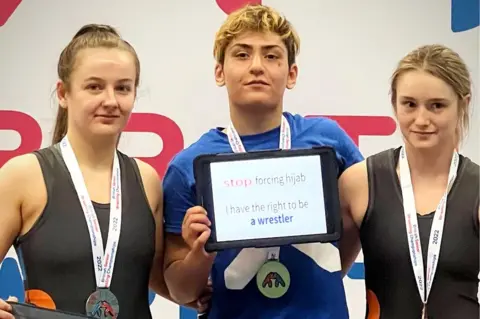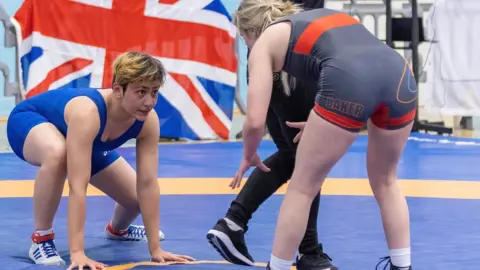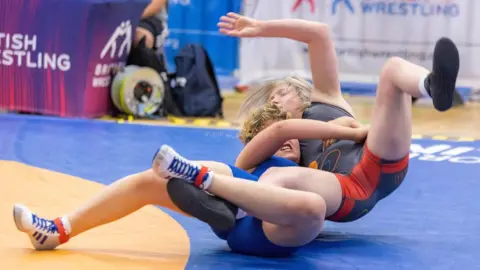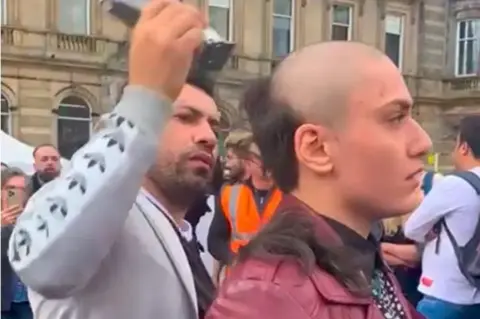Melika Balali: I got threats from Iran for wrestling in Scotland
An Iranian wrestler who won gold for Scotland has been given police security after allegedly receiving threats from her government.
Melika Balali protested against the forced wearing of the hijab on the winner's platform of a the British Wrestling Championships in June.
The 22-year-old said her family has since cut contact with her.
It came two months before the death of Mahsa Amini in police custody, which has sparked protest across Iran.
Officers reportedly beat Ms Amini, 22, after she wore the hijab "improperly" - though police deny this and say she suffered a heart attack.
After moving to Scotland last November, Ms Balali joined the Scottish Wrestling Association - for whom she won gold in the senior female competition at the British championships in Manchester.
During the medal ceremony, she held up a sign that read "stop forcing hijab, I have the right to be a wrestler".
Many women and girls in Iran have been removing the mandatory scarf in demonstrations engulfing the country.
Authorities have tried to suppress them by force, while Ayatollah Khamenei has accused the US and Israel of orchestrating "riots" - a claim dismissed by critics.

Meanwhile Ms Balali told BBC Scotland's The Nine that since she has started speaking out about women's rights, she has been sent threats from the Iranian government on social media.
She said: "They've tried to find where I'm living and who I'm practising with. But thanks to police in Scotland... I live safely, I train in a safe area - I have all kinds of security.
"The first time I wore a singlet in Manchester, my family stopped talking to me. They think they are ashamed of me.
"But I'm happy because I decided to be this kind of person. These threats make me stronger. When I receive threats from the government of Iran I just think my way is right - if I were wrong, why would they threaten me?"
Police Scotland said it was made aware of online threats having been made in July, adding: "Enquiries were carried out and a safety plan is in place."
 British Wrestling Championships/Flikr
British Wrestling Championships/FlikrBorn in Shahrekord, in Iran's Chaharmahal and Bakhtiari province, Ms Balali said her parents made her wear the hijab from the age of five.
She also said she was not allowed to pursue wrestling because she was a woman, despite it being a tradition among the men in her family.
That changed in 2018 when the Iranian Wrestling Federation created a women's team - though Ms Balali had to compete in a body suit which covered her hair, as well as shorts and a T-shirt.
Pursuing the sport more freely, she says, was the main reason she left home.
"It's not just the dress code," she said. "You see the dress covering the face, the head scarf, but it's not just the clothes. You mentally cover your mind.
"But when I'm here and wearing a singlet I feel free.
"Not because I'm free to do wrestling, because I'm not wearing three layers of clothes - but because I'm free to think, free to build something that is for me."
 British Wrestling Championships/Flikr
British Wrestling Championships/FlikrNow living in Edinburgh, Ms Balali is torn between two worlds.
Although she admits being threatened was "terrifying", she feels she can speak out about injustices from a place of relative safety in Scotland.
Watching her fellow countrywomen face violence on Iran's streets has been painful, but also makes her proud - particularly when she sees younger women on the front line of protests.
In solidarity, Ms Balali recently shaved her head at a protest in Glasgow's George Square.

As for the future, the 22-year-old said her sport has given her an important platform.
She is training at least twice a day and hopes to eventually compete internationally for Team GB.
But the growing sound of female unrest in Iran has also inspired her to continue speaking out.
"Their strength increases my energy, my potential to go for my next gold medal," she said.
"It's not only about the gold, it's about what I'm talking about. I'm using that platform to talk - if that platform is big my voice will be louder. The strength comes from my homeland.
"I lived in Iran for 18 years, but I didn't have any life. I didn't feel anything. When I abandoned Iran I came to Scotland and started thinking here - with this thinking I'm alive."
